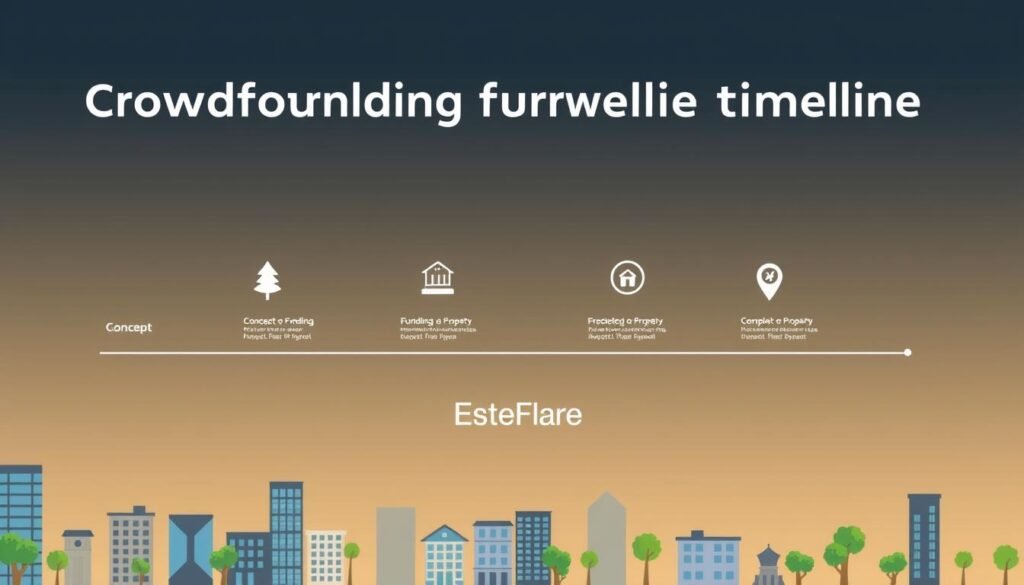In 2022, the global real estate crowdfunding market hit $32.6 billion. This shows how fast the crowdfunding process is growing in real estate. It lets people who aren’t usually investors join in, working together to fund property deals or projects.
This article will cover the basics of real estate crowdfunding. We’ll look at its benefits and how to start. You’ll learn about setting goals, choosing platforms, and making your campaign stand out. By the end, you’ll know how crowdfunding can open up new investment chances and offer good returns.
Key Takeaways
- Real estate crowdfunding lets investors work together to fund projects.
- The global real estate crowdfunding market was worth $32.6 billion in 2022.
- Crowdfunding in real estate can open doors to investments usually for big investors.
- Planning well, like setting realistic goals and picking the right platform, is key for success.
- Good marketing and engaging with your community are important to get and keep backers.
Understanding Real Estate Crowdfunding
Real estate crowdfunding is a new way for people to get into the real estate market. It lets individuals join together to fund real estate projects. This makes it easier for more people to invest in real estate, not just big companies or the wealthy.
What is Real Estate Crowdfunding?
Real estate crowdfunding means people pool their money to fund real estate projects. It lets many people own a piece of property together. This way, they can invest in real estate even if they can’t afford it alone.
Key Benefits of Real Estate Crowdfunding
The benefits of real estate crowdfunding are many:
- Diversification: It spreads risk across different projects, helping to protect against market ups and downs.
- Lower Investment Minimums: Platforms often require less money to start, making it easier for more people to invest.
- Potential for Attractive Returns: Real estate can offer stable and good returns, and crowdfunding makes these opportunities available to more people.
Real estate crowdfunding changes how people invest and grow their wealth. It lets investors diversify and get into real estate, which was hard for many to do before.
“Real estate crowdfunding has revolutionized the way people invest in this asset class, making it more accessible and inclusive than ever before.” – Jane Doe, Real Estate Investment Analyst
The Crowdfunding Process
Exploring real estate crowdfunding can be both rewarding and complex. To succeed, we’ll cover the crowdfunding steps. This includes setting funding goals, engaging with backers, and meeting post-campaign duties.
Start by setting clear crowdfunding goals. Decide on a funding target that matches your project’s needs and the market’s potential. Setting realistic goals and stretch targets can boost your chances of success.
Then, pick the right crowdfunding platform for your project and audience. These platforms provide tools and advice to make your campaign stand out.

After choosing your platform, the real effort starts. Create a captivating campaign that highlights your project’s special features and investment potential. Use visuals, detailed descriptions, and engaging content to connect with your audience.
Keeping in touch and actively engaging with backers is vital. Answer questions, share updates, and involve backers in your project. This builds trust and a strong community.
After your campaign ends, fulfill your promises and keep backers informed. This not only strengthens your reputation but also sets you up for future success.
By mastering the crowdfunding process overview, you can use real estate crowdfunding to make your vision a reality.
Setting Funding Goals
Figuring out the right funding goals is key for your real estate crowdfunding campaign’s success. It’s important to find a balance between what your project needs and what the market expects. This balance helps you reach your crowdfunding funding goals.
Realistic Fundraising Targets
To set realistic targets, analyze your project’s financial needs. This includes the property cost, renovation expenses, and any extra costs. Also, research the market to see what similar projects have raised in your area. This helps you set a target that matches your project’s needs and what investors might expect.
Stretch Goals and Overfunding
Setting realistic targets is crucial, but don’t forget about stretch goals and overfunding. Stretch goals let you raise more money to improve your project or make it bigger. Overfunding gives you a safety net for unexpected costs or new opportunities.
By thinking about your funding goals, realistic targets, and the chance for stretch goals and overfunding, you can make your real estate crowdfunding campaign a success. This way, you can make the most of your project.
Choosing the Right Crowdfunding Platform
Choosing the right crowdfunding platform is key for real estate projects. It can make or break your campaign’s success. Look at different real estate crowdfunding platforms and consider important factors to find the best one for your project.
First, check the platform’s track record. Look for platforms that have successfully funded real estate projects. Check their portfolio, read case studies, and look at testimonials to see if they are reliable and know what they’re doing.
Next, look at the platform’s fee structure. Different platforms charge different fees. It’s important to understand these costs and how they might affect your funding goals. Compare fees across platforms to find the best deal.
Investment minimums are also important. They can affect how many people can invest in your project. Some platforms have higher minimums, limiting who can invest. Others offer more flexible options for a wider range of investors.
To help you choose, we’ve made a table comparing leading real estate crowdfunding platforms:
| Platform | Track Record | Fee Structure | Investment Minimum |
|---|---|---|---|
| Platform A | Extensive experience in funding real estate projects, with a portfolio of successful campaigns. | Platform fee of 5% on funds raised, plus additional investor fees. | $5,000 minimum investment. |
| Platform B | Relatively new player in the market, but with a growing reputation for innovative real estate offerings. | Platform fee of 3% on funds raised, with no additional investor fees. | $1,000 minimum investment. |
| Platform C | Extensive experience in the real estate industry, with a diverse portfolio of funded projects. | Platform fee of 4% on funds raised, plus a 1% success fee. | $10,000 minimum investment. |
By carefully looking at real estate crowdfunding platforms and their platform selection criteria, you can choose the right one for your project. This will help you meet your funding goals.

Creating a Compelling Campaign
Making a good crowdfunding campaign is key to getting investors. In real estate crowdfunding, your project description and visuals are very important. They help grab your audience’s attention and encourage them to invest.
Project Description: Showcasing Your Vision
A great project description is crucial for your campaign. It should clearly explain your real estate project. Include details like location, property features, and investment potential.
Use exciting language to describe the opportunity. Make sure it matches what your investors want. Your description should be both useful and attractive, showing off the project’s unique benefits.
Impactful Visual Assets
Good visuals can make your campaign stand out. Use top-notch photos, renderings, or videos to show off the property. These should look great and show the project’s true value.
Investors want to see what they’re getting into. So, your visuals should be both beautiful and informative. This will help you draw in more investors and boost your chances of success.
By focusing on a strong project description and eye-catching visuals, you can grab your audience’s interest. This will help you achieve your crowdfunding goals. Think carefully about these elements to make a campaign that speaks to your investors.
Building a Backer Community
Successful real estate crowdfunding campaigns need a strong community of backers. By creating a sense of connection and keeping backers updated, you can build a loyal group. This group will support your project and help it reach its funding goals.
Engaging with Backers
Engaging with backers is crucial for building a community in crowdfunding. Here are some ways to connect with your backers and keep them interested in your project:
- Regular updates: Share updates on your campaign’s progress, including milestones and new developments. This makes backers feel informed and involved.
- Exclusive content: Give backers special access to behind-the-scenes content or sneak peeks. This makes them feel valued and appreciated.
- Ongoing communication: Answer questions quickly and encourage feedback. This shows you value their input.
- Crowdfunding community events: Host events like Q&A sessions or meetups. This brings backers together and builds a sense of community.
By regularly engaging with backers and making them feel part of your project, you can create a loyal crowdfunding community. This community will support you long after the campaign ends.
“The key to successful crowdfunding is building a community of engaged backers who feel invested in your project’s success.”
Marketing and Promotion Strategies
Getting your real estate crowdfunding off the ground needs smart marketing. You’ll need to use social media and digital marketing and traditional marketing channels to reach your audience and attract investors.
Social Media and Digital Marketing
Platforms like Facebook, Twitter, and LinkedIn are great for connecting with investors. Creating engaging content and running ads can boost your online presence. Partnering with influencers can also help draw more people to your campaign.
Email marketing is another digital tool that lets you connect directly with your network. Share updates, milestones, and special offers to keep people interested and pledging.
Traditional Marketing Channels
Don’t forget the value of traditional marketing too. Using your networks, hosting events, and getting media coverage can all help your campaign succeed.
- Ask your friends, family, and colleagues to share your project and invest.
- Host events to create a community and excitement around your project.
- Try to get your campaign featured in local media and real estate publications.
By mixing social media, digital marketing, and traditional tactics, you can craft a winning marketing plan. This plan will speak to your audience and help your real estate crowdfunding campaign thrive.
“Effective marketing is the key to unlocking the full potential of your real estate crowdfunding campaign. By leveraging a diverse mix of digital and traditional tactics, you can reach a wider audience, build trust, and ultimately secure the funding you need to bring your project to life.”
Managing the Crowdfunding Timeline
Keeping up with the crowdfunding timeline is key to a successful campaign. It ensures a smooth experience for backers. Good campaign management means planning and executing each stage well, from start to finish.
The timeline has several important phases:
- Pre-Launch Preparation: This stage is about setting up your campaign and creating engaging content. It’s important to spend enough time here to lay a solid foundation.
- Active Fundraising: Here, you promote your campaign and talk to backers. It’s vital to keep marketing and communication steady.
- Post-Campaign Fulfillment: After reaching your goal, you start delivering rewards and keeping in touch with backers. This is the hard work part.
Staying organized and realistic is crucial. Being responsive to backers is key. By managing your timeline well, you can make your campaign a success and keep backers happy.
| Stage | Key Activities | Estimated Duration |
|---|---|---|
| Pre-Launch Preparation |
|
4-8 weeks |
| Active Fundraising |
|
4-8 weeks |
| Post-Campaign Fulfillment |
|
4-12 weeks |
Understanding and managing the timeline well can lead to a successful campaign. It helps build strong relationships with backers.

Post-Campaign Fulfillment
In the world of real estate crowdfunding, the work doesn’t stop after your campaign is funded. The real challenge is in keeping your promises to backers. Post-campaign fulfillment is crucial. It needs careful planning, clear communication, and a strong commitment to delivering the project.
Delivering on Promises
As a real estate crowdfunding project creator, you must keep your promises to backers. This means managing timelines, logistics, and quality control well. Keeping backers informed is key to building trust and managing their expectations.
- Set clear timelines and milestones for project completion and backer reward fulfillment.
- Address any delays or challenges quickly and keep backers updated.
- Use strong quality control to ensure the final product or service meets expectations.
By focusing on post-campaign fulfillment, you can keep your promises and build a loyal community of backers. They will be excited to support your future projects.
“The true measure of success in crowdfunding is not just the amount raised, but the ability to fulfill the promises made to backers.” – Industry Expert
Good post-campaign fulfillment needs careful planning, clear communication, and a focus on quality. By keeping your promises, you’ll improve your reputation. This will also help you succeed in future crowdfunding campaigns.
Real Estate Crowdfunding Regulations
Understanding the rules of real estate crowdfunding is key to following the law and keeping your investors safe. As more people get into real estate crowdfunding, knowing the important rules is crucial. This knowledge helps when you start a crowdfunding project.
In the U.S., the Securities and Exchange Commission (SEC) and the Jumpstart Our Business Startups (JOBS) Act are the main rules. They cover how to offer securities, who can invest, and what information must be shared. Real estate crowdfunding sites must register with the SEC and follow certain rules. These include not advertising openly and setting limits on how much people can invest.
- Learn about the SEC’s Regulation Crowdfunding rules, which outline what real estate crowdfunding sites must do.
- Make sure your campaign follows the JOBS Act’s rules, like allowing non-accredited investors and setting investment limits.
- Follow state rules too, as some states have extra rules for real estate crowdfunding.
Talking to legal and financial experts can help you understand and follow these rules. This way, you can make sure your real estate crowdfunding project is legal and safe for your investors.
| Regulation | Key Requirements |
|---|---|
| SEC’s Regulation Crowdfunding |
|
| JOBS Act |
|
By knowing and following the right real estate crowdfunding regulations and legal compliance rules, you can make sure your campaign is a success. It also keeps your investors’ interests safe.

Risks and Challenges in Crowdfunding
Real estate crowdfunding is full of chances, but it also comes with risks and challenges. We’ll look at common hurdles to help you make smart choices and reduce risks.
Market volatility is a big crowdfunding risk. The real estate market can change a lot, affecting your investment’s performance. It’s key to do your homework, understand market trends, and spread out your investments to lessen risk.
Another issue in real estate crowdfunding is project delays. Things like construction problems or permits can cause delays. To avoid this, check the project’s timeline, the developer’s history, and have backup plans ready.
Doing your homework is vital when dealing with crowdfunding risks. You need to research the project, the platform, and the team. Know the financial details, the property’s state, and the investment’s risks.
To tackle challenges in real estate crowdfunding well, choose trusted platforms and experienced developers. Diversify your investments. Being informed and active can help you avoid risks and enjoy the benefits of this new way to invest.
“Real estate crowdfunding can be a powerful tool, but it’s important to approach it with caution and a commitment to due diligence.”
Knowing the crowdfunding risks and challenges in real estate crowdfunding helps you make better choices. This way, you can make the most of this exciting investment option.
Success Stories and Case Studies
Real estate crowdfunding has changed the game, with many success stories and case studies. These examples show how powerful this funding model is.
Take XYZ Development, for instance. They used crowdfunding to fund a mixed-use project in a fast-growing area. They got more money than they needed, thanks to their community of investors. The project not only made investors money but also improved the neighborhood, creating jobs and opportunities.
ABC Multifamily is another great example. They crowdfunded to buy and fix up a run-down apartment complex. Their campaign showed the property’s potential, drawing in investors from all walks of life. They turned the complex into a modern, thriving community. This success story has encouraged others to try crowdfunding in real estate.
| Project | Funding Goal | Actual Funding | Outcome |
|---|---|---|---|
| XYZ Development | $2.5 million | $3.1 million | Successful mixed-use project completion, community revitalization |
| ABC Multifamily | $1.8 million | $2.2 million | Acquisition and renovation of distressed apartment complex, transformation into thriving community |
These stories show how real estate crowdfunding can bring in diverse investors for innovative projects. It allows real estate pros to find new opportunities and make a positive impact in their communities.

“Real estate crowdfunding has opened up a world of possibilities for investors and developers alike. The success stories we’ve seen are a testament to the transformative potential of this investment approach.”
WHAT IS LEVERAGE IN REAL ESTATE?
Conclusion
Real estate crowdfunding is a thrilling chance for investors to dive into the property market in a new way. By understanding the crowdfunding process, we can set goals and use smart marketing. This opens up new investment doors and could lead to good returns.
Exploring real estate crowdfunding can be a smart move for your investment portfolio. It offers many benefits, like easier access and more variety. With crowdsourcing, we can see more real estate projects, making our portfolios stronger and more balanced.
As we look ahead, staying up-to-date with real estate crowdfunding news is key. Learning and adjusting our strategies helps us make the most of this new investment method. Let’s work together to unlock the potential of real estate crowdfunding and build a better future.



